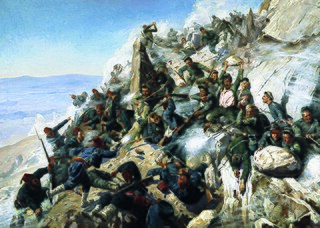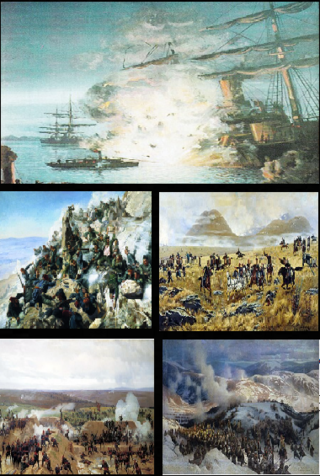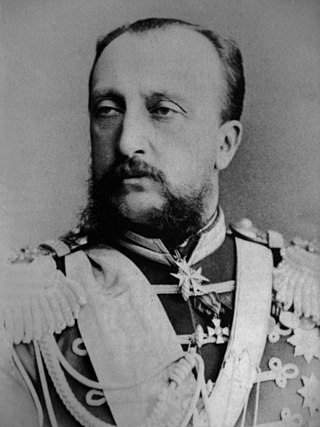| |||||
| Decades: | |||||
|---|---|---|---|---|---|
| See also: | |||||
Events from the year 1877 in Russia .
| |||||
| Decades: | |||||
|---|---|---|---|---|---|
| See also: | |||||
Events from the year 1877 in Russia .
| | This section needs expansion. You can help by adding to it. (July 2016) |
| | This section needs expansion. You can help by adding to it. (July 2016) |

Alexander III was Emperor of Russia, King of Congress Poland and Grand Duke of Finland from 13 March 1881 until his death in 1894. He was highly reactionary in domestic affairs and reversed some of the liberal reforms of his father, Alexander II. This policy is known in Russia as "counter-reforms". Under the influence of Konstantin Pobedonostsev (1827–1907), he opposed any socio-economic moves that limited his autocratic rule. During his reign, Russia fought no major wars as well; he therefore came to be known as "The Peacemaker".

1877 (MDCCCLXXVII) was a common year starting on Monday of the Gregorian calendar and a common year starting on Saturday of the Julian calendar, the 1877th year of the Common Era (CE) and Anno Domini (AD) designations, the 877th year of the 2nd millennium, the 77th year of the 19th century, and the 8th year of the 1870s decade. As of the start of 1877, the Gregorian calendar was 12 days ahead of the Julian calendar, which remained in localized use until 1923.

The Russo-Turkish War was a conflict between the Ottoman Empire and a coalition led by the Russian Empire which included Bulgaria, Romania, Serbia, and Montenegro. Fought in the Balkans and in the Caucasus, it originated in emerging 19th-century Balkan nationalism. Additional factors included the Russian goals of recovering territorial losses endured during the Crimean War of 1853–56, re-establishing itself in the Black Sea and supporting the political movement attempting to free Balkan nations from the Ottoman Empire.

The term romance has a centuries-long history. Applied to narrative ballads in Spain, it came to be used by the 18th century for simple lyrical pieces not only for voice, but also for instruments alone. The Oxford Dictionary of Music states that "generally it implies a specially personal or tender quality".

Grand Duke Nicholas Nikolaevich of Russia was the third son and sixth child of Tsar Nicholas I of Russia and Alexandra Feodorovna. He may also be referred to as Nicholas Nikolaevich the Elder to tell him apart from his son, Grand Duke Nicholas Nikolaevich of Russia (1856–1929). Trained for the military, as a Field Marshal he commanded the Russian army of the Danube in the Russo-Turkish War, 1877–1878.

The Great Western Railway Victoria Class were 2-4-0 broad gauge steam locomotives for passenger train work. This class was introduced into service in two batches between August 1856 and May 1864. They were all withdrawn between 1876 and December 1880.

Viktor Mikhaylovich Vasnetsov was a Russian artist who specialised in mythological and historical subjects. He is considered a co-founder of Russian folklorist and romantic nationalistic painting, and a key figure in the Russian Revivalist movement.

The Battle of Plovdiv, or Battle of Philippopolis, was one of the final battles of the 1877-1878 Russo-Turkish War.
The Battle of Kars was a decisive Russian victory over the Ottoman Empire during the Russo-Turkish War (1877–1878). The battle for the city took place on November 17, 1877, and resulted in the Russians capturing the city along with a large portion of the Ottoman forces defending the city. Although the actual battle for the city lasted a single night, fighting for the city began in the summer of that year. The idea of taking the city was considered impossible by some in Russian high command and many soldiers, who thought it would lead to needlessly high Russian casualties without any hopes of success due to the strength of the Ottoman position. Loris Melikov and others among the Russian command, however, devised a plan of attack that saw Russian forces conquer the city after a night of long and hard fighting. The Ottoman defeat at Kars had widespread consequences regionally, and the city was formally annexed at the Treaty of Berlin.

Grand Duke Michael Nikolaevich of Russia was the fourth son and seventh child of Emperor Nicholas I of Russia and Charlotte of Prussia. He was the first owner of the New Michael Palace on the Palace Quay in Saint Petersburg.

Charles Frederick was the reigning Grand Duke of Saxe-Weimar-Eisenach.

Charles Alexander was the ruler of Saxe-Weimar-Eisenach as its grand duke from 1853 until his death.

During the territorial evolution of Russia, the 3rd Guard Infantry division in the Russian Empire consisted of four regiments: the Litovsky Guards Regiment, Kexholm Guards Regiment, St. Petersburg Guards Regiment, and the Volhynian Guard Regiment.

Alexander II was Emperor of Russia, King of Poland and Grand Duke of Finland from 2 March 1855 until his assassination in 1881. Alexander's most significant reform as emperor was the emancipation of Russia's serfs in 1861, for which he is known as Alexander the Liberator.
The 2nd Infantry Division was an infantry unit of the Russian Imperial Army that existed in various formations from 1806 until the end of World War I and the Russian Revolution. The division fought in the Russo-Turkish War of 1877–78 and World War I.
The 14th Infantry Division was an infantry formation of the Russian Imperial Army that existed in various formations from the early 19th century until the end of World War I and the Russian Revolution. The division was based in Kishinev in the years leading up to 1914. It fought in World War I and was demobilized in 1918.
The 4th Cavalry Division was a cavalry formation of the Russian Imperial Army.
Russian Machism (//) was a term applied to a variety of political/philosophical viewpoints which emerged in Imperial Russia in the beginning of the twentieth century before the Russian Revolution. They shared an interest in the scientific and philosophical insights of Ernst Mach. Many, but not all, of the Russian Machists were Marxists, and some viewed Machism as an essential ingredient of a materialist outlook on the world. The term came into use around 1905, primarily as a polemical expression used by Lenin and Georgi Plekhanov. With a shared desire to defend an "orthodox" account of Marxism, from their own differing perspective they both divided the opponents of this putative orthodoxy into the "idealists" and the "Machists". The term remained a signifier of Marxist-Leninist opprobrium from the 1920s through into the 1970s. This was shown by Alexander Maximov's use of the term to criticize Boris Hessen in 1928. It can also be seen in Evald Ilyenkov's chapter on "Marxism against Machism as the Philosophy of Lifeless Reaction" in Leninist Dialectics and the Metaphysics of Positivism (1979).
![]() Media related to 1877 in Russia at Wikimedia Commons
Media related to 1877 in Russia at Wikimedia Commons